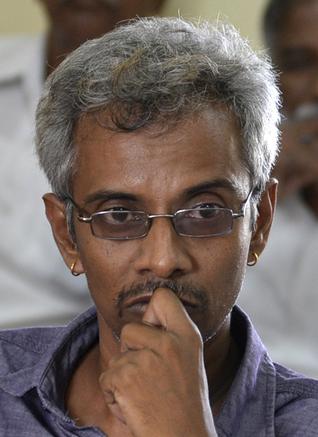BANGALORE, October 7: The legal tussle around the Kannada novel Dhundi took a new turn on Saturday after litigants alleged that author Yogesh Master had defied court orders by allowing PDF versions of his book to be circulated online.
Mr. Master, who was arrested in August on the charge of outraging the religious sentiments of Hindus, said that he would submit an affidavit on Monday to clarify that he was not responsible for the PDFs being circulated. “I have not shared the book, in parts or in whole, on the Web. If others have done so, I am not responsible,” he said.
He added that it was counterintuitive for him to do so because as a publisher he would not wish to lose potential revenue.
Currently, according to an interim order of injunction passed by a City Civil and Sessions Court where the case is being heard, the book cannot be sold or distributed until October 31 (extended from the initial date of September 28). This case was filed by Sri Ram Sene leader Pramod Mutalik and others following Mr. Master’s arrest under Section 295A (deliberate acts intended to outrage religious feelings) and Section 298 (uttering words with intent to wound religious feeling) of the Indian Penal Code.
A simple search on the Internet does not throw up links to PDFs titled ‘Dhundi’ or linked to the author. But, Dharampal, the advocate representing Mr. Muthalik, said that the submission in court was on the basis of reports published in the Kannada media that PDF versions were being liberally shared online.
“While the ban is in effect and the case is about hurting religious sentiments, distributing the book in any form is contempt of court. The PDF would not be circulated if he did not make it available.”
But can such bans on “sale and distribution” be linearly extended to the World Wide Web? Several controversial and banned books are easily available for download today on peer-to-peer networks (file sharing sites). According to Gautam John, Intellectual Property Rights lawyer, while the Internet is not outside the ambit of court diktat, it is difficult to track where and who is selling/distributing it.
For instance, if someone outside Karnataka or India does so, will the order apply, he asks.
Quoting computer science innovator John Gilmore, Mr. John said the “Internet interprets censorship as damage and routes around it.”
He added: “Once a book is removed from its physical form and digitised, it’s so much easier to transmit and consequently, to share. Once digital, it’s hard to put the sharing and distribution genie back in the bottle because the physical form is no longer a limitation. It is also easier to disguise who is sharing the book and where it is being shared from and to whom.”

